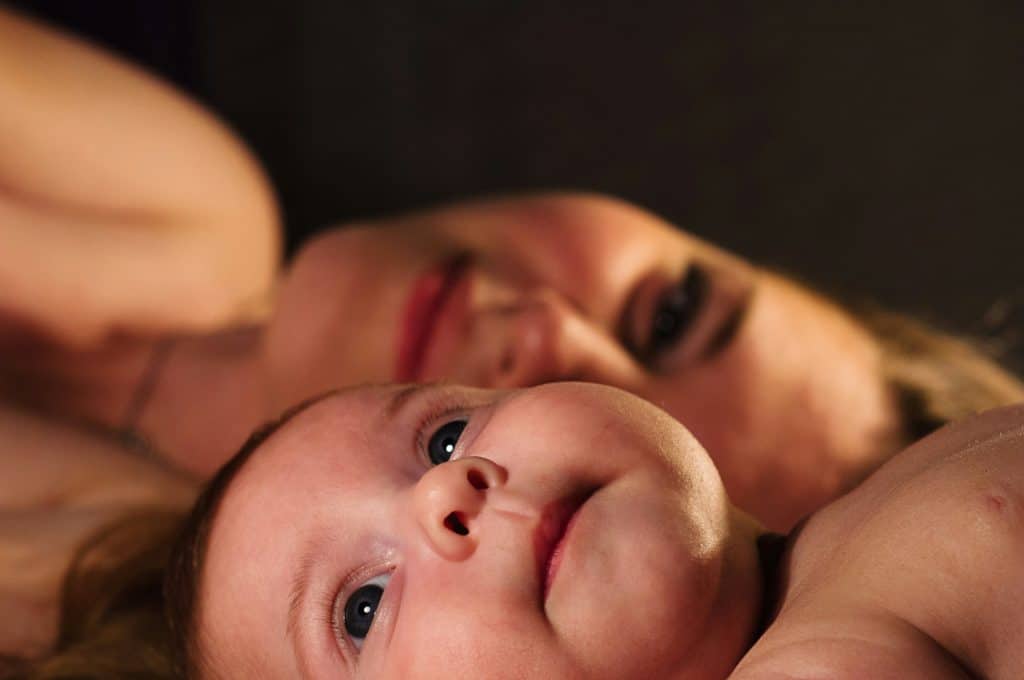Imagine peacefully watching your little bundle of joy sleeping soundly, but then you notice that their mouth is gaping open. While it may seem adorable, an open mouth during sleep can lead to a host of issues for your baby, such as dry mouth, snoring, and disturbed sleep. To help your baby sleep comfortably and breathe easier, we bring you a few simple yet effective tips to prevent babies from sleeping with an open mouth. By implementing these strategies, you can ensure a restful slumber for your little one and peace of mind for yourself.
Ensure a comfortable sleep environment
Creating a comfortable sleep environment is essential for your baby’s restful sleep. Not only will it promote better sleep quality, but it can also help prevent your baby from sleeping with an open mouth. Here are some tips to ensure a comfortable sleep environment for your little one:
Choose an appropriate mattress
The right mattress can make a significant difference in your baby’s sleep comfort. Opt for a firm mattress that provides ample support for their growing body. Avoid overly soft or plush mattresses, as they can increase the risk of suffocation. A firm mattress will help your baby maintain a natural sleeping position and reduce the likelihood of them sleeping with their mouth open.
Maintain a cool and well-ventilated room
Temperature plays a crucial role in ensuring a comfortable sleep environment. It’s best to keep your baby’s room cool, between 68 to 72 degrees Fahrenheit (20 to 22 degrees Celsius). Use a fan or air conditioning to maintain a comfortable temperature. Adequate ventilation is also important to prevent stuffiness, which can lead to mouth breathing. Open a window or use a fan to ensure proper air circulation in the room.
Use a comfortable pillow or head support
While infants do not require a pillow during sleep, using a small and suitable head support can help maintain proper positioning and prevent mouth breathing. Look for pillows or head supports specifically designed for infants to ensure optimal comfort and support. Avoid using adult-sized pillows or bulky headrests, as they may increase the risk of suffocation or discomfort for your baby.
Establish a regular sleep routine
A consistent sleep routine plays a vital role in promoting healthy sleep habits and preventing your baby from sleeping with an open mouth. By setting consistent sleep times and creating a calming bedtime routine, you can help regulate your baby’s internal clock and signal their body that it’s time to rest. Here are some tips to establish a regular sleep routine:
Set consistent sleep times
Try to establish a consistent sleep schedule for your baby. Aim for a regular bedtime and wake-up time each day. Consistency in sleep times can help regulate your baby’s internal body clock and promote deeper, more restful sleep. Stick to this schedule as closely as possible, even on weekends or during holidays.
Create a calming bedtime routine
Implementing a calming bedtime routine can help relax your baby before sleep and reduce the chances of mouth breathing. Consider activities such as a warm bath, gentle massage, or reading a bedtime story. These activities can help soothe your baby and signal that it’s time to wind down. Be consistent with the activities you choose, and try to complete the routine in the same order each night to create a sense of familiarity.
Avoid stimulating activities before bed
Stimulation before bedtime can make it harder for your baby to fall asleep and increase the likelihood of mouth breathing. Limit activities that may overstimulate your baby, such as playing with bright or noisy toys. Instead, opt for quiet and calming activities like reading a book or engaging in gentle play. Avoid the use of electronic devices close to bedtime, as the blue light emitted by screens can interfere with your baby’s natural sleep patterns.

Encourage proper positioning
Proper positioning during sleep is crucial to prevent your baby from sleeping with an open mouth. By teaching your baby to sleep on their back, using swaddles or sleep sacks, and placing rolled blankets or towels beside them, you can encourage optimal positioning and minimize the chances of mouth breathing.
Teach your baby to sleep on their back
The American Academy of Pediatrics recommends that infants sleep on their backs to reduce the risk of sudden infant death syndrome (SIDS). Sleeping on the back also promotes nose breathing, as it keeps the airway clear and open. To help your baby adjust to sleeping on their back, start placing them in this position from an early age. If your baby rolls onto their tummy during sleep, gently roll them back onto their back.
Use swaddles or sleep sacks
Swaddles or sleep sacks can provide a sense of security for your baby and help prevent them from rolling onto their tummy during sleep. These tightly wrapped blankets or wearable sacks can also help maintain proper positioning of your baby’s head and prevent mouth breathing. Ensure that the swaddle or sleep sack is not too tight, allowing your baby to move their legs and hips comfortably.
Place rolled blankets or towels beside your baby
Positioning rolled blankets or towels beside your baby can provide additional support and promote proper body alignment during sleep. These rolled items can prevent your baby from rolling onto their tummy and encourage side sleeping, which is often associated with reduced mouth breathing. Place the rolled blankets or towels beside your baby, leaving enough room for them to move their legs freely.
Address nasal congestion
Nasal congestion can contribute to mouth breathing during sleep. It’s important to keep your baby’s nose clean and clear to ensure unobstructed airflow through the nasal passages. Here are some strategies to address nasal congestion:
Keep the baby’s nose clean and clear
Regularly clean your baby’s nose using a gentle nasal aspirator or a bulb syringe. Be careful not to insert it too deeply, as it can cause discomfort or injury. Suctioning out excess mucus can help relieve congestion and allow your baby to breathe more easily through their nose.
Use a saline solution or nasal drops
Saline nasal drops or sprays can help moisturize the nasal passages and loosen mucus, making it easier for your baby to breathe through their nose. Consult with your pediatrician for the appropriate saline solution or nasal drops suitable for your baby’s age. Follow the instructions provided and administer the drops or spray as directed.
Consider a humidifier in the room
A humidifier can help add moisture to the air in your baby’s room, which can alleviate nasal congestion and promote nasal breathing. Opt for a cool-mist humidifier and ensure regular cleaning and maintenance to avoid the growth of mold or bacteria. Adjust the humidity levels to keep it between the recommended range of 40 to 60 percent.

Monitor oral breathing
Observing your baby’s breathing pattern is crucial to identify whether they are breathing through their mouth during sleep. Monitoring their breathing and seeking professional advice if concerns arise can help address any underlying issues. Here’s what you can do:
Observe your baby’s breathing pattern
Pay attention to how your baby breathes, particularly during sleep. Observe whether they primarily breathe through their nose or their mouth. If you notice regular mouth breathing, it’s important to further investigate the reasons behind it.
Check for mouth breathing during sleep
When your baby is asleep, gently check for signs of mouth breathing. Look for an open mouth, louder or irregular breathing sounds, and snoring. If you consistently notice mouth breathing during sleep, it may be a reason for concern.
Consult a pediatrician if concerns arise
If you have concerns about your baby’s breathing patterns, it’s always best to consult a pediatrician. They can assess your baby’s overall health and provide guidance and recommendations tailored to your baby’s specific needs. They may suggest further evaluation or refer you to a specialist if necessary.
Maintain optimal humidity levels
Humidity levels in your baby’s sleep environment can impact their ability to breathe through their nose. By maintaining optimal humidity levels, you can help promote nasal breathing and reduce the chances of mouth breathing. Follow these tips to ensure proper humidity:
Keep the room humidity between 40-60%
Maintaining humidity levels between 40 to 60 percent is considered optimal for your baby’s comfort and respiratory health. Use a hygrometer to measure the humidity levels in the room accurately. This range helps prevent excessive dryness or humidity that can potentially contribute to nasal congestion.
Avoid excessively dry or humid conditions
Both excessively dry and humid conditions can negatively impact your baby’s nasal passages. Dry air can dry out the nasal passages, leading to congestion, while overly humid air can promote the growth of mold or bacteria. Adjust the humidity levels accordingly within the recommended range to ensure a comfortable environment for your baby.
Use a hygrometer to monitor humidity levels
A hygrometer is a device that measures and displays the humidity levels in a room. It can help you ensure that the humidity levels are within the optimal range for your baby’s sleep environment. Place the hygrometer in the room and monitor the readings regularly to make any necessary adjustments.

Promote nose breathing during awake hours
Encouraging your baby to breathe through their nose during awake hours can help reinforce the habit of nasal breathing and minimize mouth breathing. Here are some tips to promote nose breathing during playtime and other daily activities:
Encourage nasal breathing during playtime
Engage your baby in activities that promote nasal airflow, such as blowing bubbles or playing with wind instruments (age-appropriate, of course). These activities can help strengthen nasal muscles and encourage your baby to breathe through their nose.
Engage in activities that promote nasal airflow
Activities that require your baby to use their nose, such as smelling different scents or blowing out candles on a cake, can help reinforce nasal breathing. Encourage your baby to engage their senses and use their nose actively.
Avoid pacifier or thumb sucking habits
While pacifiers can provide comfort for babies, prolonged use or thumb sucking habits can hinder nasal breathing. Limit the use of pacifiers, particularly during awake hours, to encourage your baby to breathe through their nose. If your baby uses a pacifier, consider using ones specifically designed to promote nasal breathing and not obstruct the mouth.
Discourage mouth-breathing habits
To prevent your baby from sleeping with an open mouth, it’s essential to discourage mouth-breathing habits during sleep. Here are some strategies to discourage mouth breathing:
Avoid bottle feeding during sleep
Bottle feeding can often lead to mouth breathing as the position of the bottle encourages mouth breathing rather than nasal breathing. Avoid feeding your baby while they are lying down to discourage mouth breathing during sleep. Opt for upright feeding positions that promote nasal breathing.
Offer sips of water before bedtime
Before your baby goes to sleep, offer them sips of water to keep their mouth and throat hydrated. Adequate hydration can reduce the likelihood of dry mouth and encourage nasal breathing during sleep.
Use pacifiers designed to promote nasal breathing
If your baby uses a pacifier during sleep, consider using pacifiers designed to promote nasal breathing. These pacifiers have features that keep the mouth slightly open and encourage nose breathing. Consult with your pediatrician to find suitable pacifier options for your baby.
Address potential underlying causes
If your baby consistently sleeps with an open mouth, it’s important to address any potential underlying causes. Allergies, sinus issues, or other medical conditions may contribute to mouth breathing. Here’s what you can do:
Check for allergies or sinus issues
Allergies or sinus issues can cause nasal congestion and lead to mouth breathing during sleep. If you suspect allergies or sinus problems, consult with your pediatrician for an evaluation. They may recommend allergy testing or other appropriate interventions to address the underlying issues.
Consult a pediatric dentist for guidance
In some cases, mouth breathing may be related to dental concerns, such as a misaligned bite or enlarged tonsils. Consulting a pediatric dentist can help identify any dental factors contributing to mouth breathing and provide appropriate guidance and treatment options.
Consider seeking medical evaluation if necessary
If you have tried various strategies to prevent your baby from sleeping with an open mouth, and the issue persists, it may be necessary to seek a medical evaluation. A healthcare professional can assess your baby’s overall health and determine if there are any underlying medical conditions contributing to mouth breathing during sleep.
Regularly monitor baby’s sleep habits
Regularly monitoring your baby’s sleep habits can help identify any patterns or changes that may indicate the need for further intervention. Keeping a sleep diary, seeking professional advice if sleep problems persist, and monitoring your baby’s growth and development milestones are essential steps to ensure their overall well-being.
Keep a sleep diary to track patterns
Maintaining a sleep diary can provide valuable insights into your baby’s sleep habits. Record details such as bedtime, wake-up times, duration of naps, and any observations regarding mouth breathing. This information can help you identify patterns, triggers, or changes that may be influencing your baby’s sleep.
Seek professional advice if sleep problems persist
If your baby continues to sleep with an open mouth despite your efforts, it’s best to seek professional advice. Consult with your pediatrician or a pediatric sleep specialist who can evaluate your baby’s sleep patterns, health, and provide guidance specific to your baby’s needs.
Monitor growth and development milestones
Regularly monitoring your baby’s growth and development milestones is crucial for their overall well-being. Discuss any concerns regarding their sleep habits, including mouth breathing, during routine check-ups with your pediatrician. They can provide guidance based on your baby’s growth and development stage.
By implementing these tips and strategies, you can help prevent your baby from sleeping with an open mouth. Remember, every baby is unique, and it may take some trial and error to find what works best for your little one. Be patient, and consult with healthcare professionals when needed to ensure your baby’s healthy and restful sleep.








